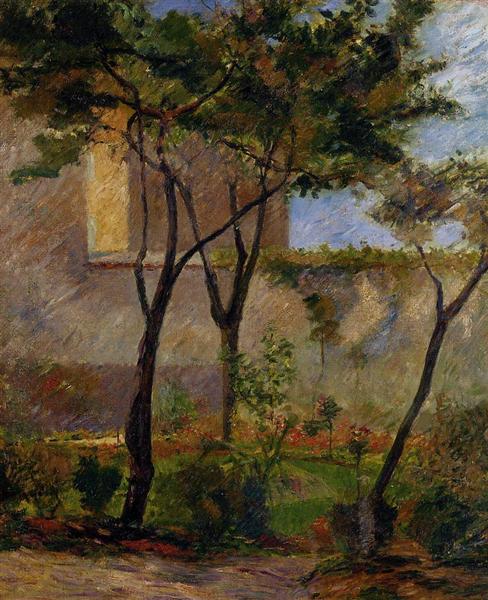Description
Paul Gauguin's "Corner of the Garden at Rue Carsal" (1881) is a fascinating testament to the artist's move towards an increasingly distinctive style, moving away from the academic conventions of his time. Painted in the context of his stay in France before his famous trip to Polynesia, this work is part of the precursors of Symbolism and Post-Impressionism, movements that advocated a more intense exploration of emotion and chromatic intensity.
The composition of the painting shows a corner of a garden, a space that, although mundane, becomes a stage for reflection and interpretation. Gauguin moves away from a descriptive and realist approach, selecting his color palette in such a way that the vibrant hues seem to resonate with each other. The lush greens of the vegetation are contrasted by touches of warmer color, which gives the scene an almost fantastical aura. This chromatic choice is one of the most notable features of his work, suggesting not only the light of the environment, but also the artist's emotional state in the face of nature.
Within the painting, we find a pair of figures who appear to be part of the landscape around them, but are not the main focus of the work. These figures, which could be interpreted as symbolic representations of everyday life, add a dimension of humanity and connection to the scene. The way they are arranged in space reflects the idea of intimacy and silence that often saturates Gauguin’s works, where the personal and the universal are often intertwined.
An interesting aspect of “Corner of the Garden Rue Carsal” is how the artist approaches the notion of depth and perspective. The work displays a less rigorous and more fluid perspective compared to the academic standards of the time. This choice seems to defy spatial logic, generating a dreamlike atmosphere that resides at the intersection of the real and the imagined. Gauguin prefers to evoke sensations and emotions through the way he chooses to represent space, creating a visual narrative that transcends the mere fact of observing a garden.
This painting can be considered one of the transitional stages in Gauguin's career, marking his distancing from the Impressionist influences that dominated his training. Later, in his Polynesian works, he would delve deeper into the essence of colour and form, but "Corner of the Garden Rue Carsal" already anticipates the free use of colour and form that would characterise his later work. This work, though more restrained, offers a glimpse of the eccentricity to come, where his search for emotional truth through art would have become the standard for which he would become known.
In conclusion, “Corner of the Garden at Rue Carsal” represents, in its simplicity, a profound complexity that invites contemplation. It is a reflection of both the intimate moments of everyday life and Gauguin’s artistic concerns in a formative period of his career. Rich in color and emotive in form, this work is a reminder of art’s ability to transcend time and space, allowing the viewer to experience a visceral connection with the world around them.
KUADROS ©, a famous painting on your wall.
Hand-made oil painting reproductions, with the quality of professional artists and the distinctive seal of KUADROS ©.
Painting reproduction service with satisfaction guarantee. If you are not completely satisfied with the replica of your painting, we will refund 100% of your money.

